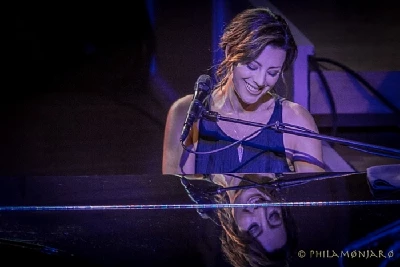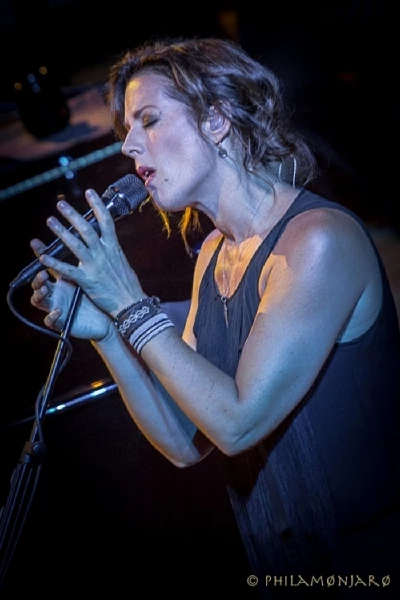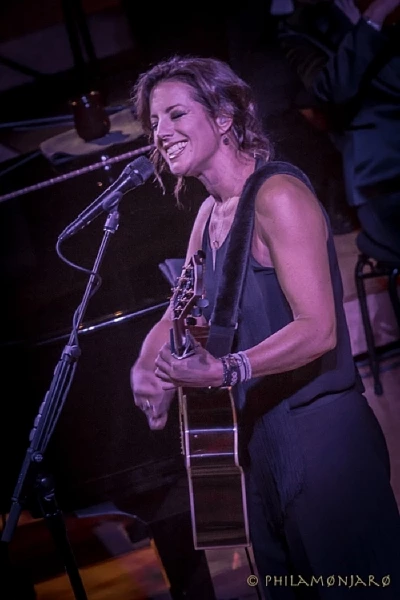published: 16 /
7 /
2020

Originally published in Examiner.com in 2016, Lisa Torem talks to multi-platinum selling Canadian singer Sarah McLachlan about her most recent LP ‘Shine On’ and her role in co-founding hugely successful all-female touring festival Lilith Fair.
Article
Canadian singer-songwriter Sarah McLachlan's voice has been called angelic and breathtaking. She’s most well-known for stunning ballads, ‘Angel,’ ‘Building a Mystery,’ ‘Adia’ and ‘Sweet Surrender,’ but has recently released a new album, “Shine On” , which includes an array of collaborations and which has garnered the coveted Juno Award. Critics and fans have praised the project for its optimistic themes and inventive textures.
Sarah recently completed an American tour in support of the release and will grace the stage of Orchestra Hall with the Chicago Symphony Orchestra in a one-off debut in honor of the 26th Annual CSO Corporate Night Benefit this June. In an exclusive interview, the multi-faceted artist talks about everything from songwriting to symphonies.
LT: Chicago is looking forward to seeing you in a few weeks for your CSO debut, but before we talk about that, let's reminisce. Can you tell us about the first song you ever wrote?
SM: My first song was called, ‘Out of the Shadows’ and it was for my first record (‘Touch’ in 1989) I was nineteen-years-old and I had just gotten a record contract. Originally, this small independent label brought me up to Vancouver and said, 'We're going to have you write with a bunch of other bands that we have on the label.' Well, they didn't talk to these other bands, so these established bands said, 'I don't want to write with this punk kid.' The label said, 'Why don't you see what you can come up with on your own?'
I said, 'Hmm.’ I'd never really written anything before but I had helped with hooks and melodies and lyrics with the band that I'd had before, but I'd never written an entire song so I had to, through trial and error, figure it out as I went along. I remember I'd been reading Jerzy Kosinski's 'Painted Bird' (1965). I loved that book and loved the story. I said, 'I'm going to write about the boy.' I wrote that song, loosely based on that book.
LT: In 2011, you performed with the Colorado Symphony Orchestra and in June you'll be performing with the CSO. What's the challenge of working in this type of setting?
SM: It's actually amazingly easy. We show up on the day of. Sean O’Loughlin is my conductor, who has written many of the arrangements. We basically run through the entire show with the symphony. We do the songs once or sometimes twice if tweaks need to be made and we do the show that night. It's amazingly efficient. They're so talented. You put a piece of music in front of them and off they go.
It's pop music and they're pop arrangements so it's not that challenging for them, I think. I could be wrong, but I think it's fairly simple for them to just get in there and bang it off. It's incredibly exhilarating to play with a symphony because obviously with a band you have a certain song that you get used to, and then when you play with a symphony you have this incredible power and force behind you and the energy is so different and really exhilarating.
LT: ‘Angel’ has been used in many situations where it has facilitated healing. Why do you think this ballad brings people together?
SM: I'm not really sure. I write from an emotional point of view and I think that it struck a chord with so many people on so many different levels. I'm really grateful It's wonderful to be able to create something that goes out there in the world and has a life beyond me and brings some kind of joy and awareness or comfort to people. Music, for me, is incredibly comforting. I go to music to soothe myself when I'm angry or frustrated and when I'm sad. Music helps me, amazingly.
LT: With ‘World on Fire,’ you also created awareness. You spent very little money on the video so that you could donate the budget to charities. Was that your idea?
SM: I can't take any credit for that idea. Sophie Muller, the video director, had that idea and she was actually very hesitant to present it to me because she wasn't sure that I would go for it, but she was sure that the record company wouldn't go for it. But I said, 'They're going to love not spending money on this. Are you kidding me?'
It's such an amazing idea. Sophie spent hundreds and hundreds of hours, not just her, but a team, compiling the animation and it was such a powerful song, such a great song for that kind of message. I was, again, thankful that the opportunity presented itself because I never would have thought of it on my own, but I was trying to come up with a good idea for the video, because it didn't seem right that it couldn't be the typical music video where I was in there singing the whole time and having some sort of images that the song evoked. That would be too obvious so her idea was so brilliant because it allowed the listener and the viewer to understand that stuff but on a very different kind of level. I loved that we were able to give away all of that money to charity, as well.
It's a great story to be able to tell. The record label loved it for obvious reasons. The idea was really unique and I'm proud of myself for Sophie's a brilliant artist and I had total faith that it would be great.
LT: You wrote, ‘Song for My Father’ for ‘Shine On’ and asked fans to submit images and recollections of their own fathers. What was the outcome?
SM: My dad was really impactful in my life and he was a great role model. I miss him every day. He passed a little over four years ago and it was around the same time that - no, it's been longer than that now, I was separating from my husband, my dad was sick, I was changing my management and record label and all of my important male anchors were falling away at the same time. Losing my dad was like losing my anchor, my rock. I wanted to honor him in some small way.
I love singing that song because I’m reminded of him and of how much he meant to me. It's not typically sad. One time, somebody asked me about the song and I was talking about him and I just burst into tears. I was surprised by the reaction because I didn't even know it was coming. I didn't expect it at all, but when I'm singing the song, I'm feeling close to him. I feel a sweetness around the relationship that we had, more than the loss. I feel the loss at different times. When I'm singing the song, I feel this closeness to him.
LT: ‘In Your Shoes’ has some beautiful vocal layering. How did you engineer those textures?
SM: I love doing that kind of stuff and I harmonize to everything. I'm always singing counter melodies to things. I will be sitting at the console and listening back to the track and I'll sing, 'Ah, Ah,' and sing some counterpoint. (Production team) 'That sounds good. We should put that in there.'
We often build a whole bunch of tracks that sometimes end up on the final tracks and sometimes they don't. With any of the songs, with any of the instrumentation, because we have our own studio, we can sit there for days! To our detriment, we can add and add and add and take away, take away, take away, just put this piece in and take another one out. Sometimes it's hard to make decisions when you have so much time and so many pieces of the puzzle, but I do love using my voice as an instrument; not just for the lyrics, but as a separate tone that exists.
LT: You worked with Bob Rock, who is essentially a rock producer (Metallica, Aerosmith) on ‘Flesh and Blood’ and ‘Love Beside Me.’ Why the shift?
SM: I was very hesitant to work with him because of that, yet I spent the day with Bob, just talking and hanging out. He's such a kind and spiritual man. I really enjoyed him and I really did want to add a raw energy to some of these songs. He really brought that out, so I'm really happy about having that relationship and working with him in that way. Pierre Marchand (long term collaborator) and I are much more, not staid, but he has sounds that he tends to go to and Bob’s a bit more of a raw, in-the-moment type of guy.
LT: So you covered all the bases.
SM: I wanted to explore and Bob encouraged that, which was great.
LT: Was ‘Beautiful Girl’ a song you wrote to your younger self?
SM: There are moments of that in there for sure. I was writing about my daughter, our relationship and the storms that we are going to have to weather. She’s thirteen now.
LT: They're really blossoming at that age. They'll never be that innocent again.
SM: Exactly. My daughter still plays with dolls and I'm really happy about that.
LT: Is ‘What's It Gonna Take?’ about angst in your life or more of a reflection?
SM: I actually wrote that for ‘King Kong’, a Broadway musical. Marius de Vries (producer of the ‘Romeo + Juliet’ OST) wrote the music and he asked me if I'd be interested in writing a song for Ann (leading actress, Ann Darrow) when she gets on the ship and figures out where she is. Obviously, it's about vulnerability and insecurity and I said, 'Oh, I know how to write about that.'
That would be a fun project because, A, there was just one song and it was a challenge, for me, because I don't typically write about one particular subject. For me, lyrically, it's usually just about exploration and whatever I happen upon. If a story reveals itself, I tend to go that way. I don't say, 'I'm going to write a song about my dad or ‘I'm going to write about X,’ it just comes out.
This needs to be explored, this needs to be talked about, so it's a fun challenge to look at a particular scene in a theatrical production and look at what she was feeling. So the idea was that she was on the ship, leaving her safe harbor and going into the unknown. I have no idea where I am. She was in two different worlds. She was kind of in love with Kong, but she's also gone back to civilization, so she has her human love and animal and she's trying to figure out how to manage that.
LT: Let's talk about an earlier song from "Surfacing". What was ‘Adia’ based on?
SM: Actually I guess I could say I betrayed my best friend and it was a really difficult time because I ended up marrying her ex-boyfriend. I fell in love with her ex and it was one of those lines you don't cross, but I did and as it turned out, it wasn't a fling, we were married for thirteen years.
But it was a really difficult time because I betrayed her trust and I lost her friendship for a while and because she was my very best friend and so it was the story of working through the anger and resentment on both sides and trying to find forgiveness.
LT: You started the Sarah McLachlan Music School in 2002. Given your experience, what is most crucial for children to learn?
SM: We use music as a guide. Music offers us the opportunity to explore our emotional world, to connect with ourselves and with each other and I think it's so important for kids to be able to understand themselves a little better and to recognize their own value. I say that because that’s what it gave me.
When I was young, I was pretty unpopular; I was picked on a lot. Music was this one piece that I could always go to, that I knew I had, that was always mine. I was good at it and it fed me. It gave me courage, strength and self-worth. That's why I think it's so imperative for kids to have that in their life. Whether they go on to become professional musicians - that's not what we're after. We're not after sending kids to (US performance art colleges) Julliard or Berkeley, although it has become a beneficial thing that has been happening.
Many of the kids have been graduating and going on to post-secondary school and becoming doctors and engineers, so it's about giving kids the opportunity to discover who they are and to be able to find joy in that and connect with that. I think that that makes them better human beings. It allows them to be able to go out into the world and be more well-rounded, more understanding and to have more empathy for their fellow humans. It's beneficial all around.
LT: You created the Lilith Fair to empower female musicians. What have been the long-term gains? Would you consider recreating the fair?
SM: No, it would have to be someone else, someone relevant now and powerful now. That being said, the cool thing is, if you look at the Top 40 and how female dominant it is, all those women are playing their own arena shows. When we did Lilith back in the ‘90s, there were a lot of great female artists having a lot of success, but all the summer festivals were completely male dominated and I thought, 'Let's just do something ourselves. Wouldn't that be great?'
I think the strength in numbers is the fact that, being together, we got to bring in and share each other's audiences and gain so many fans in that regard. It really helped a lot of our careers. Also, at the time, there was such a false competition set up. Perhaps it wasn't false, but it was important in the record labels' eyes and the radio stations' eyes, where they said, 'You can't play two women back to back' or 'I'm playing Tori this week, I can't play Sarah.' It was insulting and it was limiting.
It's just music. We're all different. We're all unique. You would never say that about guys and it really put a fire under my butt to fight that and get it changed. That is one thing that we really did stuff down the throats of the old boys' club (laughs).
You actually can play two women back to back and you actually can put two women on the same bill. Promoters were saying, 'People won't come. That's too much. There's too many women.' That is just ridiculous. I'm not good at hearing no. I think they will and we're going to prove you wrong.
I think it brought a lot of women together and definitely changed some attitudes. Culturally, and as far as society goes, it takes generations to really change peoples' perspectives and I'm really glad we had a hand in it. I think things really have been changing and shifting. Maybe we'll have a female president in America.
LT: The time has come.
SM: Wouldn't that be fantastic? A lot of women are becoming CEO's. There still is a hideous inequality as far as how many women are hired and what they get paid, but it is slowly shifting.
LT: How do you see your future trajectory?
SM: As I said, I have a thirteen-year-old girl and I'm going to be slowing down a little bit, staying home to be present for her because it's a tricky time, as you know. That being said, I'm still writing music. I'm still working. I'm thinking about doing a Christmas record because that's a good way to stay out there and still make music, but not tour for a year and I'm thinking about doing the record on a symphonic level.
LT: Thank you, Sarah.
Photographs by Philamonjaro
www.philamonjaro.com
Band Links:-
http://www.sarahmclachlan.com/
https://www.facebook.com/sarahmclachla
https://twitter.com/sarahmclachlan
Picture Gallery:-

